Unit 6 Hitting the road Developing ideas(Reading for writing) 课件(共35张PPT,内嵌视频) 2024-2025学年外研版(2024)七
文档属性
| 名称 | Unit 6 Hitting the road Developing ideas(Reading for writing) 课件(共35张PPT,内嵌视频) 2024-2025学年外研版(2024)七 | 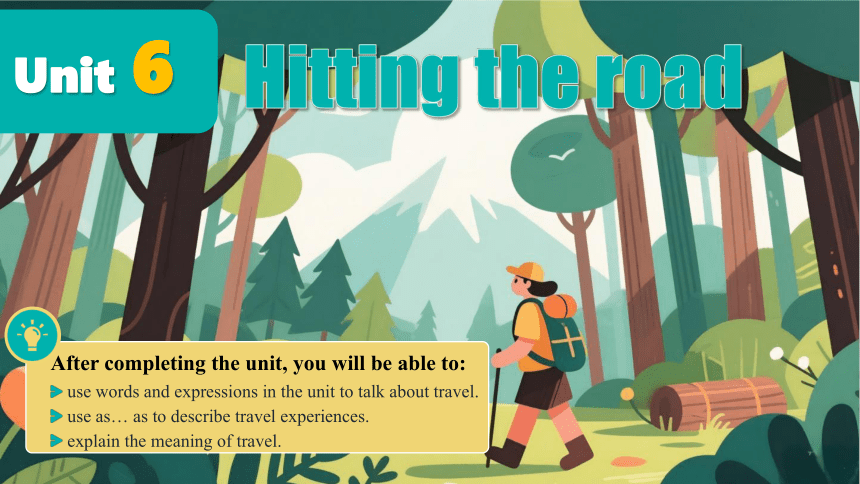 | |
| 格式 | pptx | ||
| 文件大小 | 26.2MB | ||
| 资源类型 | 教案 | ||
| 版本资源 | 外研版 | ||
| 科目 | 英语 | ||
| 更新时间 | 2025-05-01 06:45:41 | ||
图片预览

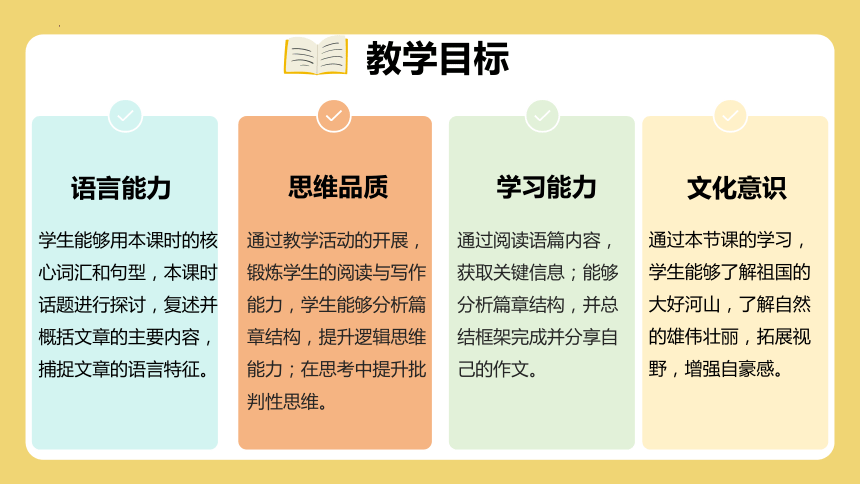
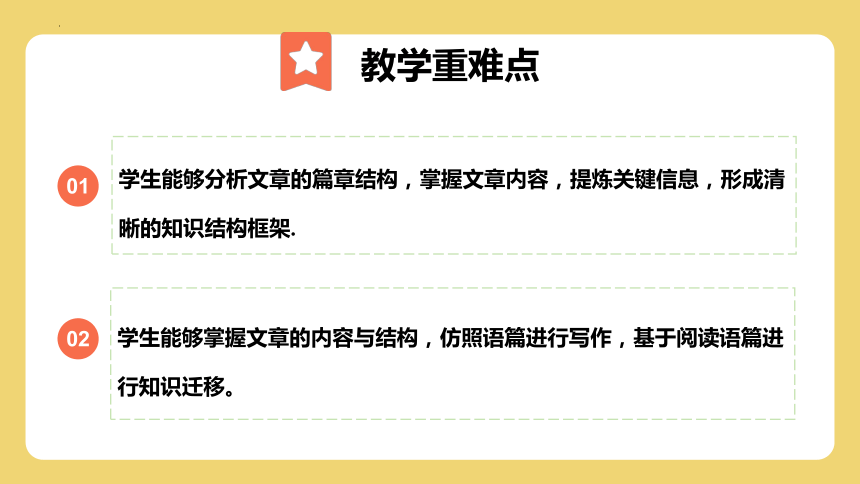

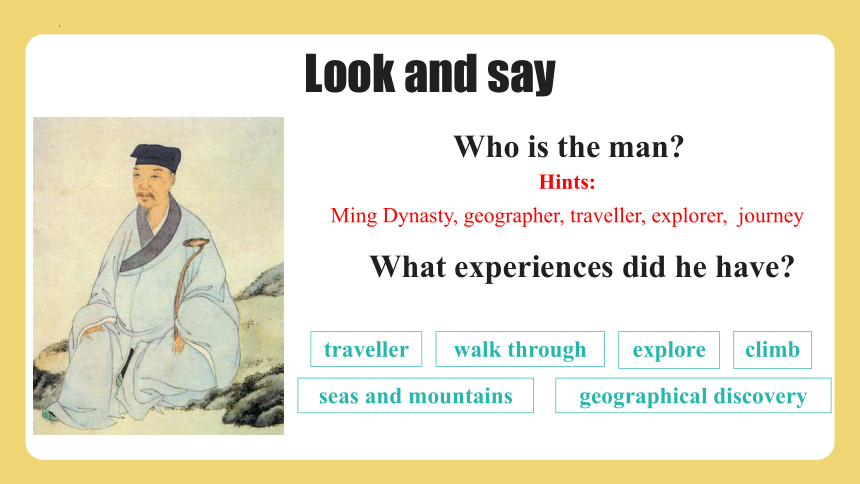
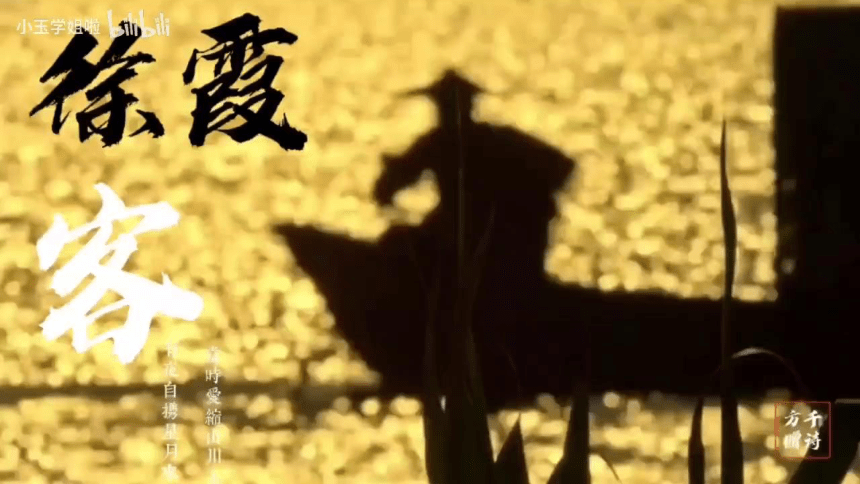
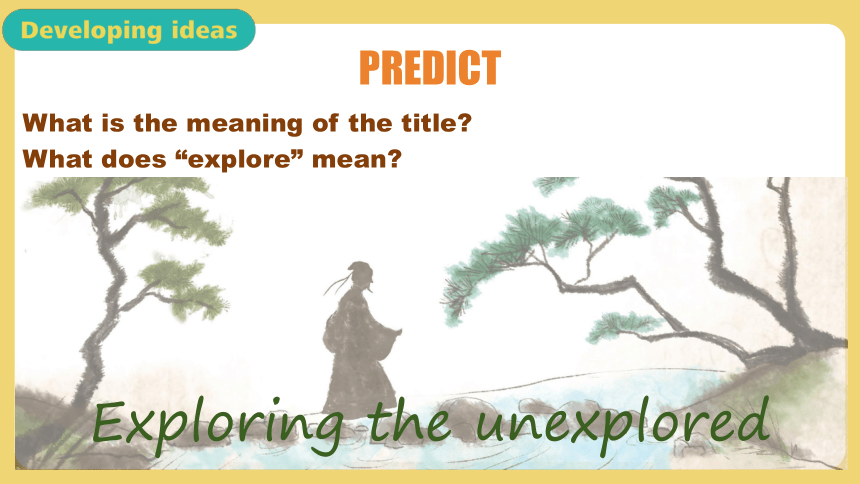
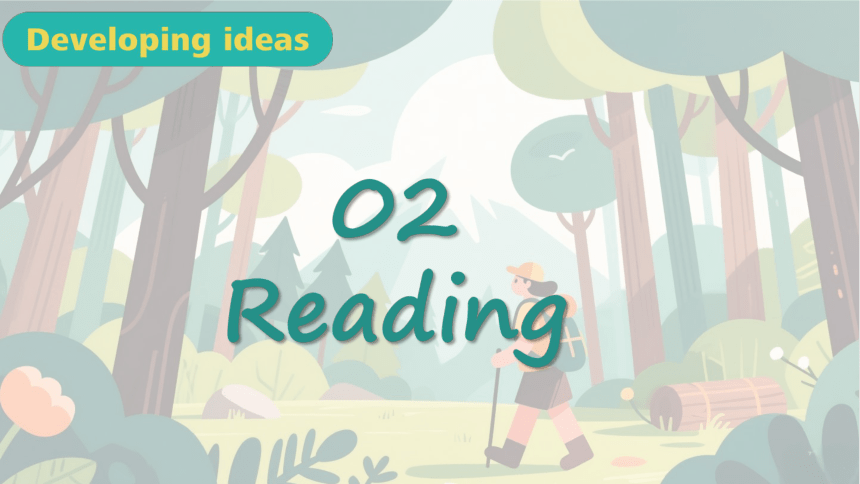
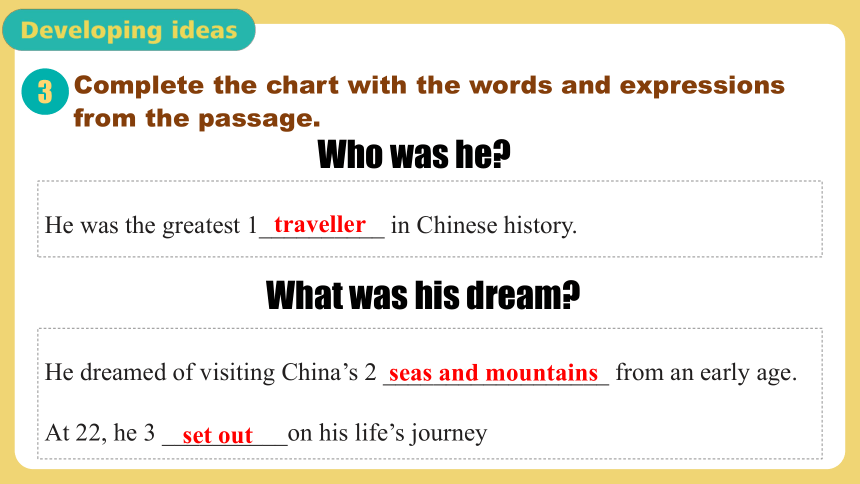
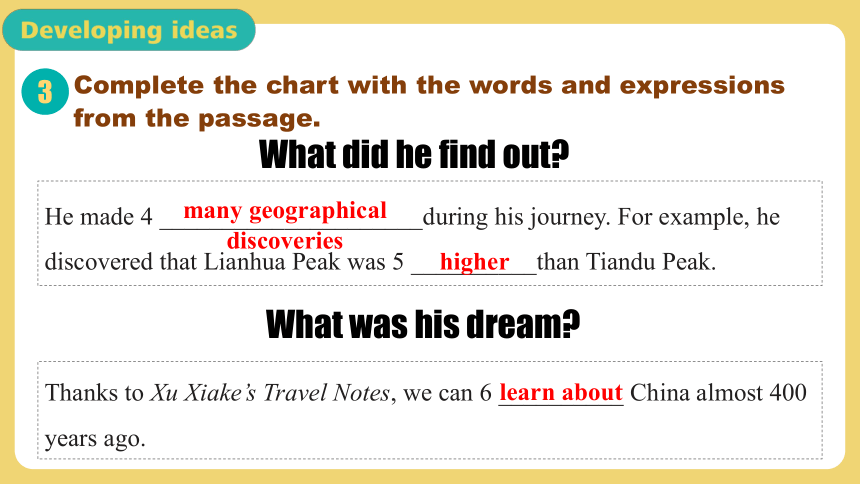
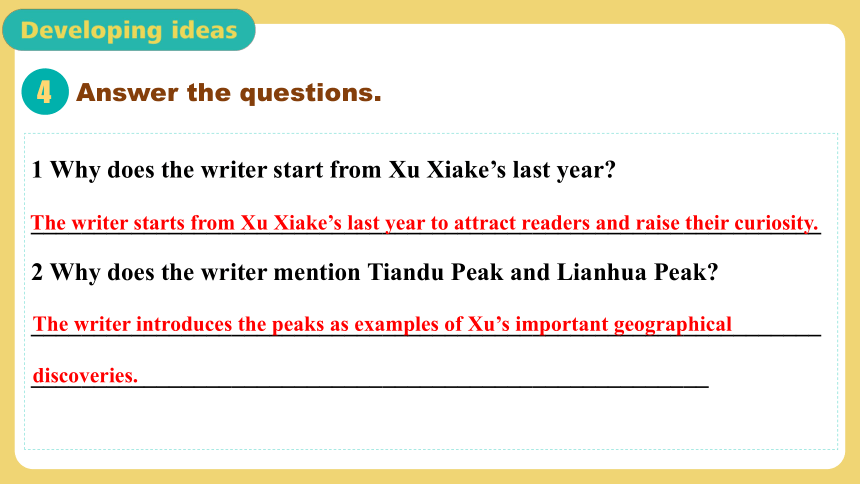
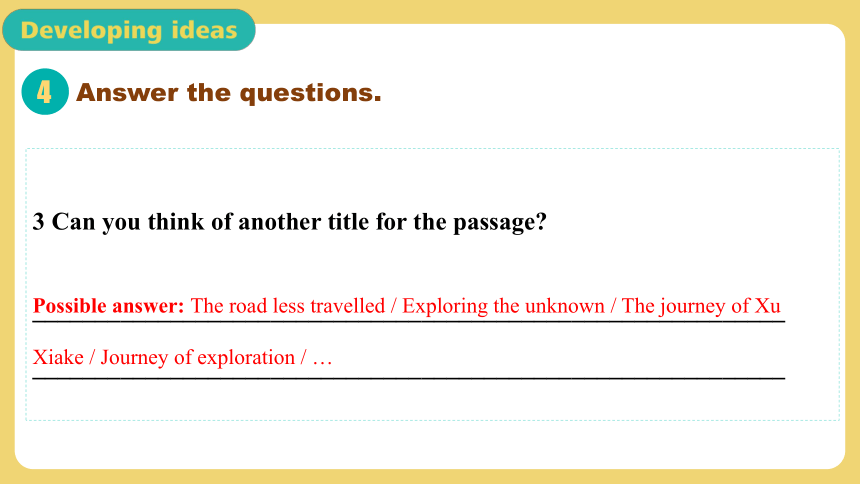
文档简介
Hitting the road
Unit 6
After completing the unit, you will be able to:
use words and expressions in the unit to talk about travel.
use as… as to describe travel experiences.
explain the meaning of travel.
思维品质
学习能力
文化意识
语言能力
教学目标
学生能够用本课时的核心词汇和句型,本课时话题进行探讨,复述并概括文章的主要内容,捕捉文章的语言特征。
通过教学活动的开展,锻炼学生的阅读与写作能力,学生能够分析篇章结构,提升逻辑思维能力;在思考中提升批判性思维。
通过阅读语篇内容,获取关键信息;能够分析篇章结构,并总结框架完成并分享自己的作文。
通过本节课的学习,学生能够了解祖国的大好河山,了解自然的雄伟壮丽,拓展视野,增强自豪感。
学生能够分析文章的篇章结构,掌握文章内容,提炼关键信息,形成清晰的知识结构框架.
学生能够掌握文章的内容与结构,仿照语篇进行写作,基于阅读语篇进行知识迁移。
01
02
教学重难点
01
Warming up
Who is the man?
Hints:
Ming Dynasty, geographer, traveller, explorer, journey
Look and say
traveller
walk through
geographical discovery
explore
seas and mountains
climb
What experiences did he have?
PREDICT
What is the meaning of the title?
What does “explore” mean?
Exploring the unexplored
02
Reading
Complete the chart with the words and expressions from the passage.
3
Who was he?
He was the greatest 1__________ in Chinese history.
traveller
What was his dream?
He dreamed of visiting China’s 2 __________________ from an early age. At 22, he 3 __________on his life’s journey
seas and mountains
set out
Complete the chart with the words and expressions from the passage.
3
What did he find out?
He made 4 _____________________during his journey. For example, he discovered that Lianhua Peak was 5 __________than Tiandu Peak.
many geographical discoveries
What was his dream?
Thanks to Xu Xiake’s Travel Notes, we can 6 __________ China almost 400 years ago.
higher
learn about
Answer the questions.
1 Why does the writer start from Xu Xiake’s last year?
_______________________________________________________________2 Why does the writer mention Tiandu Peak and Lianhua Peak?
_____________________________________________________________________________________________________________________
4
The writer starts from Xu Xiake’s last year to attract readers and raise their curiosity.
The writer introduces the peaks as examples of Xu’s important geographical discoveries.
Answer the questions.
3 Can you think of another title for the passage?
____________________________________________________________
____________________________________________________________
4
Possible answer: The road less travelled / Exploring the unknown / The journey of Xu Xiake / Journey of exploration / …
Think and share
1. What do you think of Xu Xiake?
Possible answer: I think Xu Xiake was brave, because his journeys were dangerous. I also think he was curious, because most people didn’t travel much in those days.
2. Do you want to be someone like Xu Xiake?
Possible answer: Yes, I want to be like Xu Xiake. I want to travel and discover new places and facts. I want to share my knowledge with the world.
03
Writing
Write a short introduction to another great traveller.
5
Plan your introduction and answer the questions.
Step 1
Who is this person?
Example: Marco Polo was a famous traveller from Italy.
Write a short introduction to another great traveller.
5
Plan your introduction and answer the questions.
Step 1
Why is this person famous?
Example: He travelled to Asia with his dad and uncle on the Silk Road. Marco Polo became famous because of his travels.
Write a short introduction to another great traveller.
5
Plan your introduction and answer the questions.
Step 1
What are this person’s achievements?
Example: There was a book about his time in Asia called The Travels of Marco Polo. This book helped people in Europe learn about different cultures and places.
Write a short introduction to another great traveller.
5
Plan your introduction and answer the questions.
Step 1
What are people’s comments on this person?
Example: People think he was brave and his stories were interesting. Many other travellers were inspired by him.
Write a short introduction to another great traveller.
5
Plan your introduction and answer the questions.
Step 1
What’s your opinion of this person?
Example: I think Marco Polo was a curious traveller. His stories remind us to be open to new things and learn from others.
5
Step 2
Write your introduction as a paragraph with the help of the questions.
Step 4
Check. Did you: ? cover the key information about the traveller?
? use the words and expressions from the reading passage?
? give your opinion of the great traveller?
Step 5
Share your paragraph with the class.
Write a short introduction to another great traveller.
Marco Polo was a famous traveller from Italy. He travelled to Asia with his dad and uncle on the Silk Road. Marco Polo became famous because of his travels. There was a book about his time in Asia called The Travels of Marco Polo. This book helped people in Europe learn about different cultures and places.
SAMPLE
People think he was brave and his stories were interesting. Many other travellers were inspired by him. I think Marco Polo was a curious traveller. His stories remind us to be open to new things and learn from others.
SAMPLE
04
Grammar
1
achieve
v. 实现(目标、梦想等);达到(目的);取得(成绩、成功、进步等);完成(任务、工作等)
She finally achieved her goal of becoming a doctor.
她最终实现了成为一名医生的目标。
He has achieved remarkable progress in his studies this semester.
他这学期在学习上取得了显著的进步。
They achieved the project on time despite the difficulties.
尽管困难重重,他们还是按时完成了这个项目。
2
动词不定式(短语)作目的状语
动词不定式(短语)作目的状语时,通常可以放在句首或句末
I came here to see you. 我来这儿是为了见你。
To pass the exam, he studies very hard. 为了通过考试,他学习非常努力。
He got up early to catch the first bus. 他早起是为了赶上第一班公交车。
否定形式:在动词不定式(短语)前加 “not” 构成否定形式
He worked hard not to fail the exam.
他努力学习为了不考试不及格。
3
both
作形容词:意为 “两个;两个都”,后面接名词复数形式
She has read both books. 她两本书都读过了。
作代词:表示 “两者;双方;两人”,在句中可作主语、宾语等成分
Both of them are students. 他们两个都是学生。
作副词:意为 “双方;两者都”,放在系动词、助动词或情态动词之后,实义动词之前
We have both seen the movie. 我们两个都看过这部电影。
4
regret
v. 感到遗憾;惋惜;后悔
regret doing sth:表示对已经做过的事情感到后悔、遗憾
I regret telling him the secret. 我后悔告诉了他这个秘密。
regret to do sth:通常表示对即将要做的事情感到遗憾
I regret to inform you that you didn't pass the exam.
我很遗憾地通知你,你没有通过考试。
n. 遗憾;懊悔;惋惜
He refused the invitation with regret. 他遗憾地拒绝了邀请。
05
Exercises
1. They reached many p________(山顶) this year.
2. He made some new d______________(被发现的事实) in science.
3. The place in the middle of the forest remained u_____________(未经勘察的).
4. The importance of the town has something to do with its g_______________(地理的) areas.
5. She was s____________(严重地) ill, but her daughter didn't know that.
Exercise
eaks
iscoveries
nexplored
eographical
eriously
1. 那会儿我们还是学生。
_____________________ we were students.
3. 他从小就对音乐感兴趣。
____________________, he was interested in music.
5. 多亏了老师的建议,我最后得到了这份工作。
_____________ the teacher's advice, I got the job in the end.
6. 因为我不擅长英语,所以我需要花很多时间在英语上。
Because I'm not good at English, I need to _________ much ____________ it.
Exercise
At the/that time
From an early age
Thanks to
spend
time on
06
Summary
Grammar
achieve、动词不定式(短语)作目的状语、both、regret
Reading
Exploring the unexplored
Write a short introduction to another great traveller.
Writing
07
Homework
Homework
Review the keywords and sentence structures in today’s lesson.
2. Finish your composition.
SEE YOU NEXT CLASS!
Unit 6
After completing the unit, you will be able to:
use words and expressions in the unit to talk about travel.
use as… as to describe travel experiences.
explain the meaning of travel.
思维品质
学习能力
文化意识
语言能力
教学目标
学生能够用本课时的核心词汇和句型,本课时话题进行探讨,复述并概括文章的主要内容,捕捉文章的语言特征。
通过教学活动的开展,锻炼学生的阅读与写作能力,学生能够分析篇章结构,提升逻辑思维能力;在思考中提升批判性思维。
通过阅读语篇内容,获取关键信息;能够分析篇章结构,并总结框架完成并分享自己的作文。
通过本节课的学习,学生能够了解祖国的大好河山,了解自然的雄伟壮丽,拓展视野,增强自豪感。
学生能够分析文章的篇章结构,掌握文章内容,提炼关键信息,形成清晰的知识结构框架.
学生能够掌握文章的内容与结构,仿照语篇进行写作,基于阅读语篇进行知识迁移。
01
02
教学重难点
01
Warming up
Who is the man?
Hints:
Ming Dynasty, geographer, traveller, explorer, journey
Look and say
traveller
walk through
geographical discovery
explore
seas and mountains
climb
What experiences did he have?
PREDICT
What is the meaning of the title?
What does “explore” mean?
Exploring the unexplored
02
Reading
Complete the chart with the words and expressions from the passage.
3
Who was he?
He was the greatest 1__________ in Chinese history.
traveller
What was his dream?
He dreamed of visiting China’s 2 __________________ from an early age. At 22, he 3 __________on his life’s journey
seas and mountains
set out
Complete the chart with the words and expressions from the passage.
3
What did he find out?
He made 4 _____________________during his journey. For example, he discovered that Lianhua Peak was 5 __________than Tiandu Peak.
many geographical discoveries
What was his dream?
Thanks to Xu Xiake’s Travel Notes, we can 6 __________ China almost 400 years ago.
higher
learn about
Answer the questions.
1 Why does the writer start from Xu Xiake’s last year?
_______________________________________________________________2 Why does the writer mention Tiandu Peak and Lianhua Peak?
_____________________________________________________________________________________________________________________
4
The writer starts from Xu Xiake’s last year to attract readers and raise their curiosity.
The writer introduces the peaks as examples of Xu’s important geographical discoveries.
Answer the questions.
3 Can you think of another title for the passage?
____________________________________________________________
____________________________________________________________
4
Possible answer: The road less travelled / Exploring the unknown / The journey of Xu Xiake / Journey of exploration / …
Think and share
1. What do you think of Xu Xiake?
Possible answer: I think Xu Xiake was brave, because his journeys were dangerous. I also think he was curious, because most people didn’t travel much in those days.
2. Do you want to be someone like Xu Xiake?
Possible answer: Yes, I want to be like Xu Xiake. I want to travel and discover new places and facts. I want to share my knowledge with the world.
03
Writing
Write a short introduction to another great traveller.
5
Plan your introduction and answer the questions.
Step 1
Who is this person?
Example: Marco Polo was a famous traveller from Italy.
Write a short introduction to another great traveller.
5
Plan your introduction and answer the questions.
Step 1
Why is this person famous?
Example: He travelled to Asia with his dad and uncle on the Silk Road. Marco Polo became famous because of his travels.
Write a short introduction to another great traveller.
5
Plan your introduction and answer the questions.
Step 1
What are this person’s achievements?
Example: There was a book about his time in Asia called The Travels of Marco Polo. This book helped people in Europe learn about different cultures and places.
Write a short introduction to another great traveller.
5
Plan your introduction and answer the questions.
Step 1
What are people’s comments on this person?
Example: People think he was brave and his stories were interesting. Many other travellers were inspired by him.
Write a short introduction to another great traveller.
5
Plan your introduction and answer the questions.
Step 1
What’s your opinion of this person?
Example: I think Marco Polo was a curious traveller. His stories remind us to be open to new things and learn from others.
5
Step 2
Write your introduction as a paragraph with the help of the questions.
Step 4
Check. Did you: ? cover the key information about the traveller?
? use the words and expressions from the reading passage?
? give your opinion of the great traveller?
Step 5
Share your paragraph with the class.
Write a short introduction to another great traveller.
Marco Polo was a famous traveller from Italy. He travelled to Asia with his dad and uncle on the Silk Road. Marco Polo became famous because of his travels. There was a book about his time in Asia called The Travels of Marco Polo. This book helped people in Europe learn about different cultures and places.
SAMPLE
People think he was brave and his stories were interesting. Many other travellers were inspired by him. I think Marco Polo was a curious traveller. His stories remind us to be open to new things and learn from others.
SAMPLE
04
Grammar
1
achieve
v. 实现(目标、梦想等);达到(目的);取得(成绩、成功、进步等);完成(任务、工作等)
She finally achieved her goal of becoming a doctor.
她最终实现了成为一名医生的目标。
He has achieved remarkable progress in his studies this semester.
他这学期在学习上取得了显著的进步。
They achieved the project on time despite the difficulties.
尽管困难重重,他们还是按时完成了这个项目。
2
动词不定式(短语)作目的状语
动词不定式(短语)作目的状语时,通常可以放在句首或句末
I came here to see you. 我来这儿是为了见你。
To pass the exam, he studies very hard. 为了通过考试,他学习非常努力。
He got up early to catch the first bus. 他早起是为了赶上第一班公交车。
否定形式:在动词不定式(短语)前加 “not” 构成否定形式
He worked hard not to fail the exam.
他努力学习为了不考试不及格。
3
both
作形容词:意为 “两个;两个都”,后面接名词复数形式
She has read both books. 她两本书都读过了。
作代词:表示 “两者;双方;两人”,在句中可作主语、宾语等成分
Both of them are students. 他们两个都是学生。
作副词:意为 “双方;两者都”,放在系动词、助动词或情态动词之后,实义动词之前
We have both seen the movie. 我们两个都看过这部电影。
4
regret
v. 感到遗憾;惋惜;后悔
regret doing sth:表示对已经做过的事情感到后悔、遗憾
I regret telling him the secret. 我后悔告诉了他这个秘密。
regret to do sth:通常表示对即将要做的事情感到遗憾
I regret to inform you that you didn't pass the exam.
我很遗憾地通知你,你没有通过考试。
n. 遗憾;懊悔;惋惜
He refused the invitation with regret. 他遗憾地拒绝了邀请。
05
Exercises
1. They reached many p________(山顶) this year.
2. He made some new d______________(被发现的事实) in science.
3. The place in the middle of the forest remained u_____________(未经勘察的).
4. The importance of the town has something to do with its g_______________(地理的) areas.
5. She was s____________(严重地) ill, but her daughter didn't know that.
Exercise
eaks
iscoveries
nexplored
eographical
eriously
1. 那会儿我们还是学生。
_____________________ we were students.
3. 他从小就对音乐感兴趣。
____________________, he was interested in music.
5. 多亏了老师的建议,我最后得到了这份工作。
_____________ the teacher's advice, I got the job in the end.
6. 因为我不擅长英语,所以我需要花很多时间在英语上。
Because I'm not good at English, I need to _________ much ____________ it.
Exercise
At the/that time
From an early age
Thanks to
spend
time on
06
Summary
Grammar
achieve、动词不定式(短语)作目的状语、both、regret
Reading
Exploring the unexplored
Write a short introduction to another great traveller.
Writing
07
Homework
Homework
Review the keywords and sentence structures in today’s lesson.
2. Finish your composition.
SEE YOU NEXT CLASS!
同课章节目录
